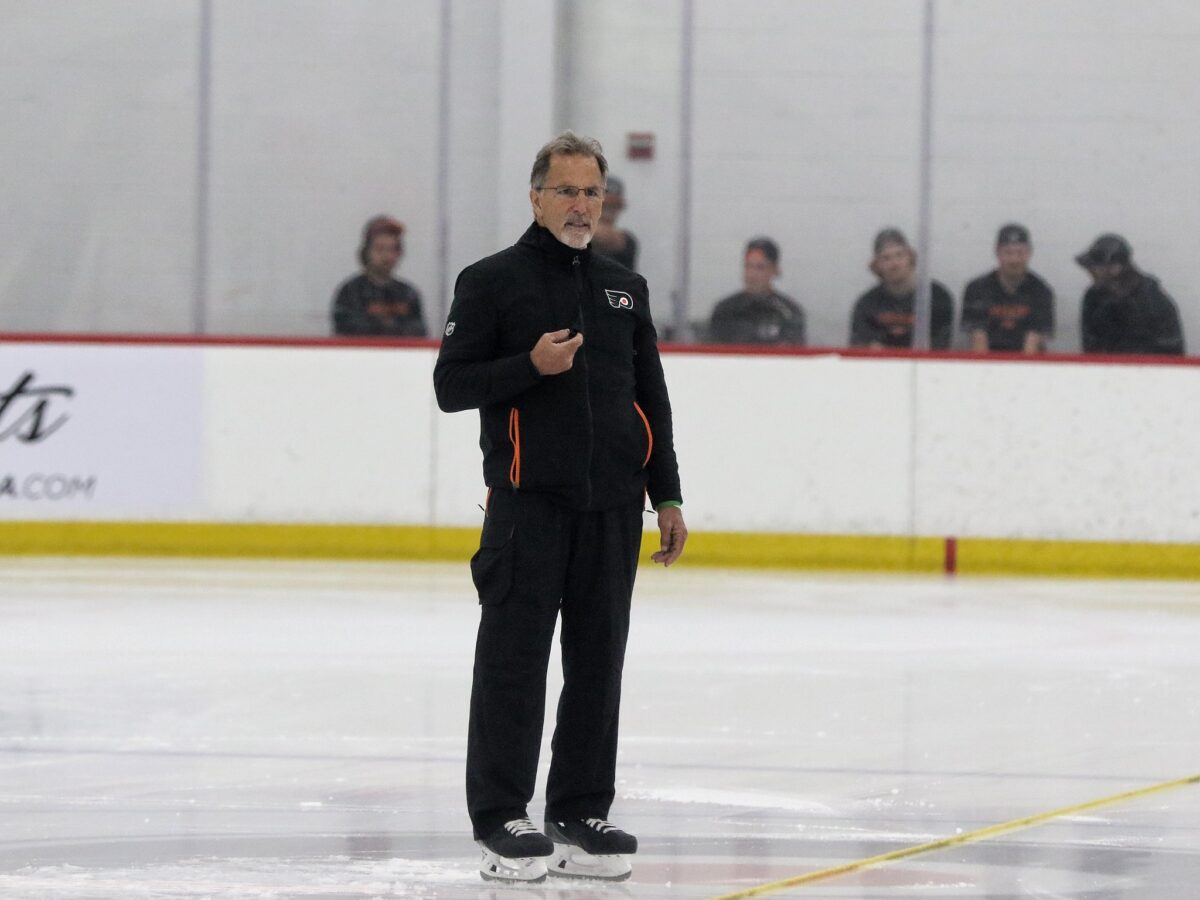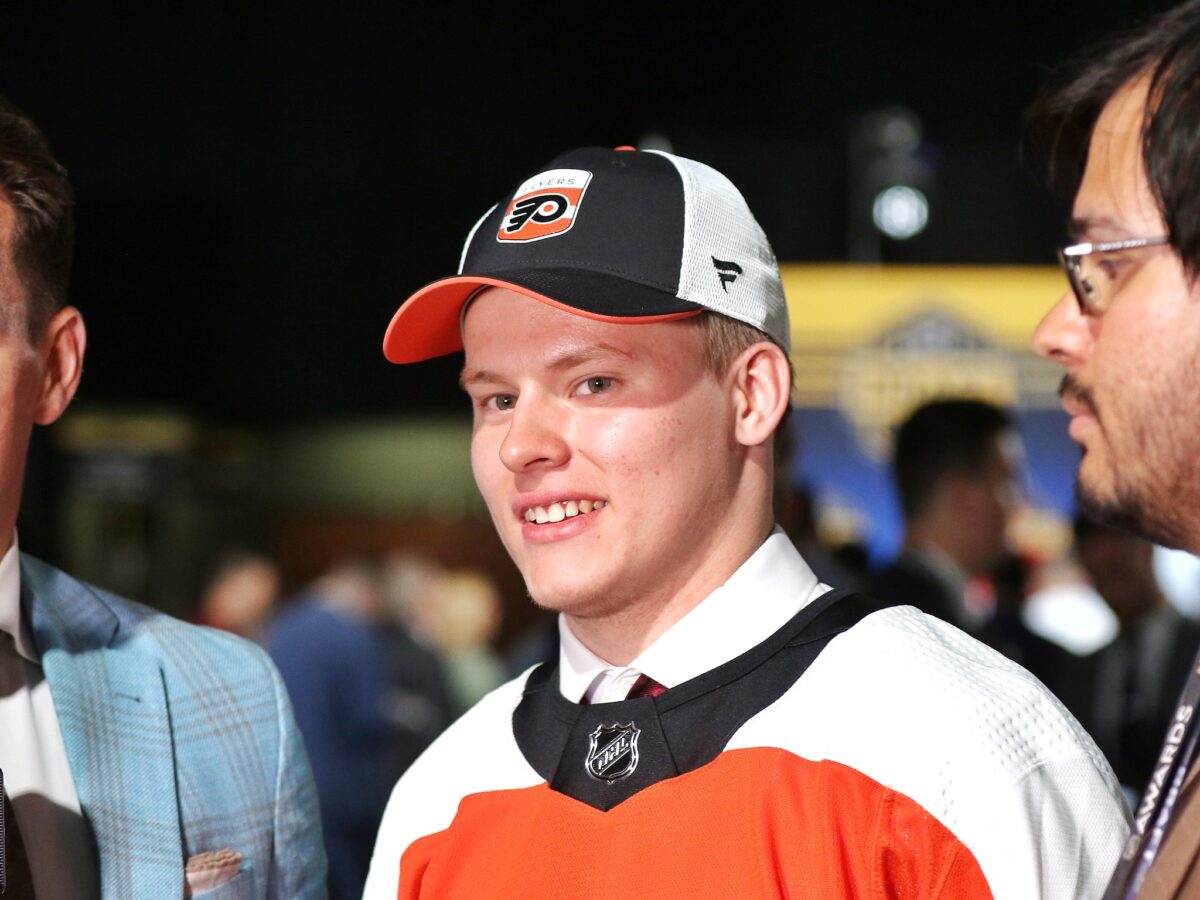We’re less than three months away from the 2024-25 NHL regular season, meaning that the reality of Matvei Michkov in a Philadelphia Flyers uniform is not too far away. All we’re left with now is speculation, which has brought about some discussions on how the 19-year-old will perform in his rookie campaign.
Some people worry about whether or not a hard-nosed head coach like John Tortorella will be too much for the youngster to handle. Not only will this not be an issue, but the veteran coach will likely have a bit of a soft spot for who he dubbed the “Mad Russian” when speaking to the media last season. Why is that?
Tortorella Is Biased Toward His Best Offensive Players
By far the biggest concern with Michkov’s game is the fact that he doesn’t put an emphasis on playing defense—sometimes, he openly neglects it. With a coach like Tortorella who preaches defense, it makes sense for people to connect those dots and worry a bit about how that sort of relationship would play out. As described in this article, their clash of egos might actually not be the worst thing in the world.

Tortorella is undeniably hard on some of his players. But “some” is the keyword there. He is renowned as the coach who treats all of his players the same, whether it be a depth player or a first-line staple, but that is actually untrue. He is as biased as anyone, and that especially applies to his top offensive producers—something that Michkov instantly projects to be.
One of Tortorella’s most obvious biases was for Travis Konecny. A lot of people claim he is a two-way player, but that couldn’t be further from the truth based on both the stats test and the eye test. At even strength, his 0.66 relative expected goals against per 60 (xGA/60 Rel) were in the 8th percentile of forwards with at least 200 minutes of ice time last season—he preached offense to the fullest extent, even if he played on the penalty kill.
Speaking of the penalty kill, that’s where his lack of care for defense was the most egregious—you don’t lead the NHL in short-handed goals without taking risks. Early in the season against the Anaheim Ducks, he had plenty of open ice to clear a puck with under 30 seconds left to go on a penalty. Instead, he tried to rush up the ice for an opportunity the other way, fumbled the puck, and got scored on almost instantly after. That was the game-winning goal.
So, Tortorella must have gone ballistic and benched Konecny for the rest of the game, right? Wrong. In fact, the 27-year-old winger never saw the bench for the entirety of last season. A player like Bobby Brink, on the other hand, made a mistake in the defensive zone against the Washington Capitals late in the season and was seldom given a chance outside of fourth-line minutes after that occurred—even coaches who are known for accountability can be biased.
The biggest reason for this level of hypocrisy is simple: Konecny is a better offensive player than Brink. When the former makes a mistake, it’s okay because he scored 68 points and was objectively the best contributor to Tortorella’s offense. The latter cannot make mistakes like that, because he never showed the offensive upside to back it up.
This wasn’t just the case with Konecny, either. Owen Tippett struggled just as much as anyone in his own zone (15th percentile xGA/60 Rel) but never got the Brink treatment, either. Tortorella relied on Tippett a lot throughout the season, even when he was struggling to score. Why? Because his offensive potential exceeded any non-Konecny player on the roster—his offensive talent essentially provided him with a force field from punishment.
Throughout Tortorella’s tenure, he simply has not had offensive talent. There were instances where he actually complained about not having the talent to make plays, which obviously limited the potential of his rosters. Even a coach with a reputation like him knows how important offense is—he was never going to make an already big problem worse than it needed to be by benching his top offensive producers.
Michkov is arguably a better pure offensive player at the age of 19 than Konecny and Tippett are now, but we’ll discuss why that is later. If Tortorella isn’t going to make the lives of two borderline star players miserable, he most certainly won’t do it with someone who projects to be a superstar—that’s just not who he is.
Michkov Has Dealt with Difficult Coaches Already
Just for a minute, let’s pretend that Tortorella actually did give Michkov a hard time. We have enough evidence to assume that this isn’t going to happen, but let’s entertain the idea anyway. Well, even Tortorella’s antics should be a walk in the park compared to what the 19-year-old had to deal with in the Kontinental Hockey League (KHL) over the past two seasons.
At just 18 years of age in the KHL, Michkov’s tracking data was better than any draft-year player in a professional league that you may ever see. His offensive numbers were not just great, but generational—he was one of the best players in the top professional European league as a teenager.
Despite all of that, Michkov couldn’t find a roster spot with his main club, SKA St. Petersburg, in either 2022-23 or 2023-24. His coach, Roman Rotenberg, never really gave him a chance even if he was better than any forward on the roster. Instead, he was forced to play with a lower-level KHL team, HK Sochi—the talent gap between playing for St. Petersburg and Sochi was immense.
Rather than playing with nearly NHL-caliber teammates, Michkov had to settle. He was the offensive mastermind for his team and had to elevate those around him far more than he would have needed to on SKA, so this definitely hurt him. Still putting up 41 points in 48 KHL games whilst battling pneumonia, it certainly didn’t slow him down.
No matter how well Michkov played, there was just no chance he was going to please Rotenberg. Tortorella isn’t perfect, but his biggest goal right now is to make Michkov the best player he can be and win some hockey games in the process. Neither is possible without the two being on the same page. Sure, there might be some conflicts, but they will both be beneficial to one another at the end of the day.
Tortorella Will Appreciate Michkov’s Game
While Michkov doesn’t have the details of his defensive game figured out, he should still be a player that Tortorella appreciates even if he never becomes an excellent player in his own zone. The reason for this is that he has not had a player as gifted as Michkov in a long time.

Michkov has a generational offensive mind—it is one that not a single coach can teach. His ability to create offense does have to do with his high-end offensive instincts like his shooting, passing, and skating, but those aren’t his biggest assets. Instead, his hockey IQ is the defining trait of his game. His brain makes it so he finds unique ways to score—that’s why he’s so dangerous. He doesn’t rely on athleticism, but rather, his creativity. Even with age, that ability doesn’t go away.
During his time coaching with the Tampa Bay Lightning, Tortorella used to have a player with an unmatched hockey IQ—his name is Martin St. Louis. Now, this is not a declaration that Michkov will be as good or better than the undersized Hall of Fame winger, but it serves as a comparison.
Related: Martin St. Louis, the Little Big Man
Tortorella’s last season in Tampa Bay (2007-08) coincided with the start of Natural Stat Trick’s tracking data. That season, St. Louis was in the 1st percentile of forwards in even-strength xGA/60 Rel at 0.77—that didn’t stop him from averaging 24:17 of ice time, leading all NHL forwards by 50 seconds. Simply, the offense was too good to ignore—deep down, he was a player that Tortorella had immense admiration for.
Following St. Louis’ retirement, Tortorella was able to speak on him and his game. He talked about how he was impossible to coach and extremely stubborn but praised him for his competitive nature and drive to win by any means necessary. That sounds like Michkov so much that it’s eerie.
Again, Michkov is not St. Louis—comparing a teenager to a Hall of Fame player is jumping the gun. But are we supposed to assume that Tortorella holds one player in the highest regard yet dislikes the other? Personally, I find that hard to believe. From what he said in his speech, the two players sound like the same exact person.
How Michkov will handle the demands of the NHL will ultimately be up to him. Rest assured, Tortorella likely won’t slow him down—the veteran coach will probably be the best thing for the “Mad Russian,” and we have good reason to believe that.